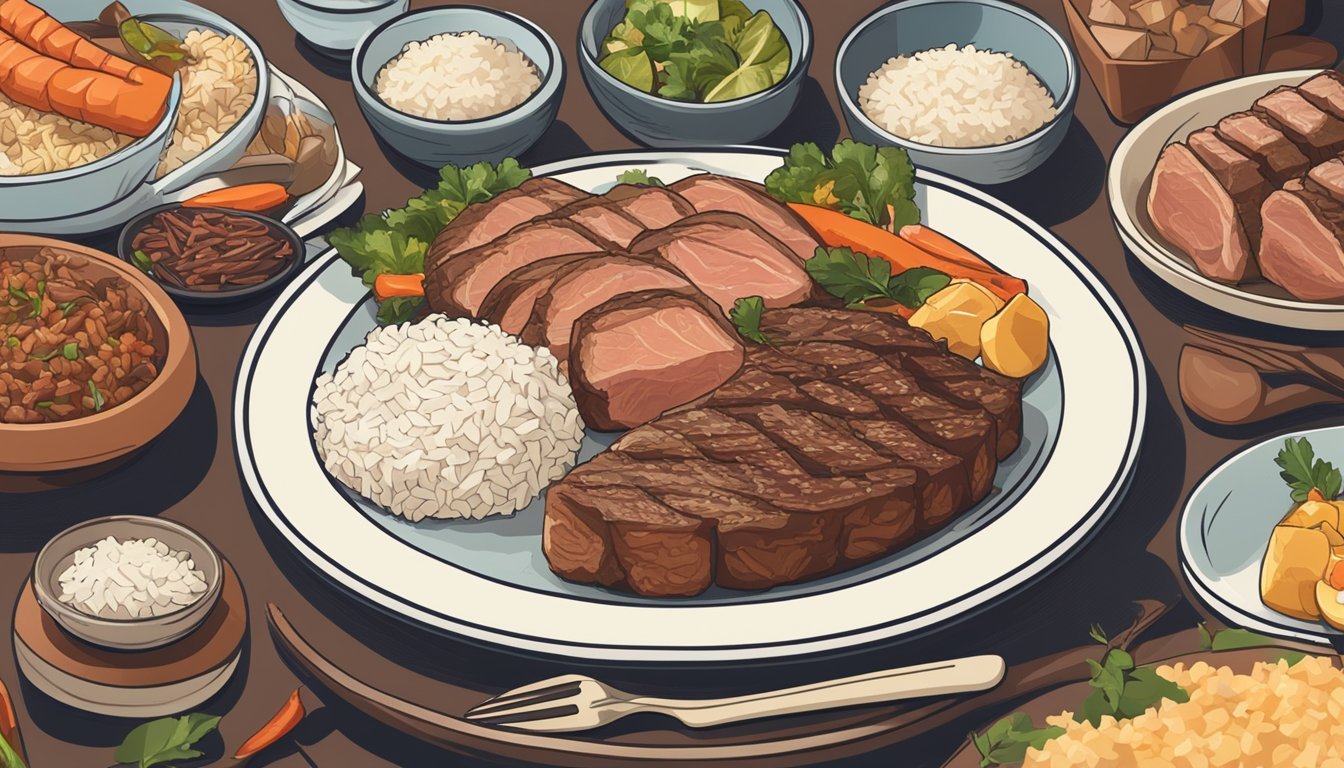Carnivore Diet vs. The Rice Diet
Exploring Health Impacts of Carbohydrate Intake
The Carnivore Diet and the Rice (What wine goes well with rice?) Diet sit at opposite ends of the dietary spectrum with regards to carbohydrate consumption and its impacts on health. The former is characterized by a complete avoidance of plant-based foods, focusing exclusively on animal proteins and fats — essentially eliminating carbohydrates. Its adherents argue for benefits like weight loss and reduced inflammation, although potential risks such as nutrient deficiencies and long-term health impacts remain controversial topics within the nutrition community.
On the other hand, the Rice Diet is a high-carbohydrate, low-fat, and low-sodium diet initially developed for the treatment of chronic kidney disease and hypertension. It emphasizes the consumption of rice, fruits, vegetables, and grains, thus providing a high intake of fiber, vitamins, and minerals while maintaining a low intake of proteins and fats. This diet has been associated with health benefits including weight loss, improved heart health, and better blood sugar control for those with diabetes.
These two diets exemplify the stark contrast in nutritional approaches — one almost entirely devoid of carbohydrates, the other reliant on them as a staple source of energy. Both have their proponents and critics, and both raise important questions about the role of carbohydrates in overall health, the adaptability of the human metabolism, and the optimal diet for chronic disease prevention and management.
Background on Dietary Patterns
Dietary patterns significantly impact health outcomes. In the discussion of the carnivore and rice diets, one emphasizes animal products while the other focuses on plant-based food groups, offering contrasting approaches to nutrients such as proteins, fats, and carbohydrates.
Overview of Carnivore Diet
The carnivore diet is a regime that typically includes only animal products. It favors consumption of meat, considering it a primary source of protein and fat, while eliminating carbohydrates almost entirely. Proponents claim it supports weight loss and can improve certain health conditions. This diet is heavy in meat, eggs, and dairy, excluding other food groups like grains and plant-based foods entirely. The dietary pattern omits fiber and concentrates largely on high-fat and protein-rich foods.
Overview of The Rice Diet
In contrast, the rice diet is a predominantly plant-based diet that accentuates carbohydrates, specifically from rice and other grains. It is low in fat and sodium, often used historically for weight loss and treatment of high blood pressure and kidney diseases. This diet includes rice as a staple component, accompanied by fruits, vegetables, and sometimes small amounts of lean protein or dairy. It is rich in fiber and while it includes carbohydrates predominantly from rice, it can include other carbohydrate sources from plant-based diets.
Nutritional Composition
The Carnivore and Rice Diets vary significantly in their nutritional composition, specifically in terms of macronutrient and micronutrient profiles. These differences have distinct ramifications for health and wellness.
Macronutrients in Focus
Protein: The Carnivore Diet provides a high-protein intake, as it consists exclusively of animal products. In contrast, the Rice Diet is lower in protein, given its focus on rice and other carbohydrates, sometimes supplemented with fruits and vegetables.
Fat: The Carnivore Diet is rich in fats, particularly saturated fats from animal sources. The Rice Diet is low in fats, as it emphasizes carbohydrate consumption, though the inclusion of plant-based foods may provide some healthy unsaturated fats.
Carbohydrates: Carbohydrate intake is nearly zero on the Carnivore Diet, while the Rice Diet is high in carbohydrates, primarily from rice, which also serves as its primary energy source.
Fiber: Fiber is virtually absent in the Carnivore Diet due to the exclusion of plant-based foods. On the other hand, the Rice Diet may contain fiber if whole grains, fruits, and vegetables are included.
Micronutrients and Vitamins
Minerals: On a Carnivore Diet, individuals may consume adequate amounts of certain minerals like iron, which is readily available in red meats (What wine goes well with red meat?). Conversely, the Rice Diet may lack certain minerals unless carefully planned to include a variety of plant-based foods.
Vitamins: Vitamin intake can vary greatly with these diets. Carnivore Diet adherents obtain fat-soluble vitamins (A, D, E, K) predominantly from animal foods, but may lack certain water-soluble vitamins found in plants. The Rice Diet can provide a range of vitamins if supplemented with fruits and vegetables, but may be low in B12, which is found in animal products.
Nutrients: The nutritional breadth of the Carnivore Diet is limited given its exclusion of plant-based foods; this can influence overall nutrient diversity. The Rice Diet may offer a greater variety of nutrients, but only if it includes a broad selection of plant-based foods to balance the high carbohydrate content.
Both diets have distinct nutritional profiles, with the Carnivore Diet focusing heavily on protein and fats, and the Rice Diet centered on carbohydrates, each with their own set of vitamins and minerals. Individuals must carefully consider their overall nutritional needs when choosing between these dietary approaches.
Benefits and Challenges
When examining the Carnivore Diet and the Rice Diet, it is essential to consider the benefits and challenges, especially regarding carbohydrate consumption and its impact on health. These diets present stark contrasts in their approach to carbs, which purportedly leads to different health outcomes.
Health Benefits Asserted by Proponents
Carnivore Diet:
Weight Loss: Proponents claim significant weight loss due to a high-protein, low-carb intake that may induce a state of ketosis, similar to a ketogenic diet.
Blood Sugar Control: Minimal carbohydrate intake may benefit individuals with type 2 diabetes by stabilizing blood sugar levels.
Rice Diet:
Reduced Risk of Chronic Disease: A high complex carbohydrate, low-fat approach is posited to potentially lower risks for chronic diseases such as heart disease and certain types of cancer.
Potential Risks and Concerns
Carnivore Diet:
Heart Disease: High intake of red and processed meat could raise cholesterol levels, increasing the risk of heart disease.
Constipation and Nutrient Deficiencies: Lack of dietary fiber and variety may result in constipation and deficiencies in certain nutrients.
Rice Diet:
Nutrient Deficiencies: While being low in fat, it can be overly restrictive, leading to potential nutrient deficiencies.
Glucose Levels: Elevated carbohydrate consumption might not be ideal for those with diabetes, possibly affecting glucose management.
Comparative Analysis
This section delves into the details of how the Carnivore Diet and the Rice Diet influence facets of health such as weight management, blood sugar control, cardiovascular health, and digestive system function.
Effects on Weight Management
The Carnivore Diet, which prioritizes meat and animal products, may lead to weight loss due to its high protein content and potential to reduce appetite. However, it lacks dietary fiber found in carbohydrates. On the other hand, the Rice Diet, being low in fat and high in complex carbohydrates, can also be effective for weight loss when calories are restricted.
Impact on Blood Sugar and Diabetes
The Rice Diet offers a higher intake of carbohydrates, which are broken down into glucose - the sugar that becomes elevated in diabetes. This diet may help manage blood sugar levels when incorporating whole grains. Contrastingly, the Carnivore Diet has minimal carbohydrate content, which may benefit individuals with type 2 diabetes or insulin resistance by reducing the demand for insulin.
Cardiovascular Health Implications
The Carnivore Diet is rich in saturated fats, which can raise LDL cholesterol levels, increasing the risk of heart disease. In contrast, the Rice Diet is lower in saturated fat and may potentially lower cholesterol levels. However, the effect on cardiovascular disease is influenced by the overall dietary pattern and lifestyle.
Gut Health and Digestive Concerns
A diet rich in animal products may lack dietary fiber, important for the gut microbiome and bowel regularity, potentially increasing risks for conditions like constipation and colon cancer. Conversely, the Rice Diet is typically higher in fiber, which supports digestive health but may lack certain nutrients provided by animal products.
Lifestyle and Practical Considerations
When assessing diets like the Carnivore and the Rice Diet, one should consider lifestyle impact and adherence feasibility, as well as the diets' environmental footprints.
Ease of Adherence to Diet
Following a restrictive diet such as the Carnivore Diet, which consists solely of animal protein, or the Rice Diet, primarily based on rice and other plant-based foods, can present challenges related to lifestyle and medications.
Carnivore Diet: This diet may simplify meal planning since it eliminates food groups, but it can be socially isolating and may conflict with existing health conditions that necessitate a more balanced approach, or any medications being taken.
Rice Diet: With a high emphasis on carbohydrates, its restrictiveness on other food groups might make long-term adherence difficult for those accustomed to a more varied diet.
Adherence to any diet is individual and can vary widely based on personal preferences, social engagements, and one's health status.
Sustainability and Environmental Impact
The environmental sustainability of a diet reflects its long-term viability for both the planet and the population.
Carnivore Diet: A diet high in animal protein is typically resource-intensive, with a significant environmental footprint due to high water and land usage, as well as greenhouse gas emissions from livestock.
Rice Diet: Diets rich in plant-based foods generally have a lower environmental impact; however, monoculture farming practices, such as those sometimes used for large-scale rice production, can lead to soil degradation and biodiversity loss.
One’s dietary choice should take into account not only personal health but also the broader implications for environmental health.
Diets in Medical Literature
The medical literature provides diverse insights into the health impacts of diets with varying macronutrient compositions. Notably, the carnivore diet, focusing on animal products, and the high-carb, plant-based rice diet each have unique implications for chronic diseases, particularly cardiovascular diseases.
Research Findings on Carnivore Diet
The carnivore diet, consisting almost exclusively of animal products such as red meat and often associated with higher intakes of saturated fat, has been sparingly studied. However, emerging research suggests that individuals following a carnivore diet might risk altering their gut microbiota composition, potentially leading to enhanced intestinal reabsorption of bile acids and cholesterol. This could, in turn, accelerate cholesterol accumulation in the bloodstream. Furthermore, dietary patterns that significantly favor animal-derived protein and fat, such as red meat and processed meat, have been connected to higher mortality rates. Yet, due to the limited number of studies, definitive conclusions on the long-term health impact of the carnivore diet remain tentative.
Research Findings on the Rice Diet
Alternatively, the rice diet, predicated on high-carbohydrate, plant-based food intake, presents a contrasting profile in medical literature. Diets rich in carbohydrates, particularly those deriving a majority of calories from plant sources like rice, are often lower in saturated fat and have been linked with lower mortality risks when compared to low-carbohydrate, high-fat diets. The optimal range of carbohydrate consumption for health, as suggested by some studies, falls around 50-55% of total caloric intake. Diets that deliver a balance of macronutrients, combining plant-based carbohydrates from rice with other food groups, are recommended to fulfill nutritional needs and are associated with favorable outcomes in mitigating the risk of chronic and cardiovascular diseases.
Advisory from Health Professionals
Health professionals often emphasize the importance of a balanced diet and medical supervision when adopting any drastic dietary changes. Registered dietitians and nutritionists can offer tailored advice on nutritional intake and potential health risks.
Nutritional Recommendations
Registered Dietitians (RDs) and Certified Nutritionists commonly advise on the necessity of consuming a varied and balanced diet to meet all of an individual's nutritional needs. They may caution against diets like the Carnivore Diet, which restricts consumption to animal products and eliminates carbohydrates, as it may lack essential nutrients found in plant-based foods, such as fiber, vitamins, and minerals.
Essential Nutrients: Recommending sources for vitamins and minerals typically obtained from a variety of food groups, they underscore the risk of nutritional deficiencies.
Fiber Intake: Specifically, they note the absence of fiber in the Carnivore Diet, which is crucial for digestive health.
Conversely, a Rice Diet primarily emphasizes carbohydrate intake and may also result in nutritional inadequacies due to the lack of protein and fats if not properly balanced.
Diversified Carbohydrates: Nutritionists may suggest incorporating different types of whole grains along with rice to enhance the nutrient profile.
Protein and Fat: The inclusion of lean protein and healthy fat sources is important for bodily functions and overall health.
Risk Management and Supervision
Health professionals stress the importance of Medical Supervision when following restrictive diets like the Carnivore or Rice Diet, especially for individuals with pre-existing health conditions or those who are taking medications.
Monitoring Health Risks: They often recommend regular check-ups to monitor any emerging health risks and adjust the diet accordingly.
Under medical supervision, professionals can alter Medications as needed, given that dietary changes can affect how the body processes certain drugs.
Adverse Reactions: Diet-induced alterations in pharmacokinetics might necessitate adjustments to medication dosages to prevent adverse reactions.
In conclusion, while exploring dietary options like the Carnivore or Rice Diet, seeking the advice and oversight of health professionals is crucial to ensure safety, nutritional adequacy, and to appropriately manage any associated health risks.
Diet Adopters' Perspectives
Adopters of both the Carnivore and Rice Diets share diverse experiences through personal anecdotes and community feedback, revealing the multifaceted nature of dietary adherence and outcomes.
Personal Success Stories
Shawn Baker, a proponent of the Carnivore Diet, often touts it as a means for significant weight loss and improved health markers. Individuals following this diet report experiencing weight reduction and a decrease in symptoms related to autoimmune conditions. They express a heightened sense of satiety, typically eating only once or twice a day, which they believe contributes to simpler diet adherence. Here are two testimonials:
"After switching to the Carnivore Diet, my energy levels surged, and I lost 20 pounds without feeling starved." – Jake, 34
"Carnivore simplified my meals and my joint pain has drastically reduced." – Emily, 29
Challenges and Criticisms from Users
Conversely, users of the Carnivore Diet also report social challenges, as the diet's restrictive nature makes it difficult to participate in traditional social dining situations. Furthermore, some individuals experience a challenging transition period known as “keto flu,” involving headaches and fatigue, believed to be a result of carbohydrate withdrawal. Here's how some users describe their challenges:
"Dining out has become nearly impossible due to limited menu options that fit the diet's criteria." – Sarah, 41
"The first few weeks were rough. I felt tired and irritable, which made me question if it was worth it." – Mark, 36
The Rice Diet, in contrast, is not typically associated with Shawn Baker, but rather with its origins from Duke University's Walter Kempner in the 1930s as a low-fat, low-sodium diet to combat chronic conditions like hypertension. It is high in carbohydrates and restricts the intake of protein and fat. Adherence to the Rice Diet often requires meticulous attention to detail and a radical shift from standard eating patterns, which adopters may find socially isolating or difficult to maintain over time.
Conclusion
Carnivore Diet vs. The Rice Diet
When evaluating the Carnivore and Rice Diet in the context of carbohydrate consumption and health, individuals should consider the long-term impacts on their nutrition and overall wellbeing. The Carnivore Diet, characterized by its exclusion of carbohydrates, prioritizes meat and animal products. It may lead to a reduction in fiber intake and a lack of essential nutrients typically obtained from plant-based sources.
In contrast, the Rice Diet is rich in carbohydrates and significantly lower in protein and fats. It includes rice, fruits, and vegetables, promoting higher fiber consumption and a myriad of vitamins and minerals. This diet, however, might lead to an excessive intake of carbohydrates for some individuals, potentially affecting blood sugar levels and overall metabolic health.
A balanced diet is crucial for maintaining health. Nutritional balance can often be achieved through a diet that incorporates a variety of food groups, providing a range of macro- and micronutrients necessary for optimal body function. Lifestyle choices should consider individual health goals, existing conditions, and personal preferences while striving for a diet that supports both physical and metabolic health.
Ultimately, the most sustainable diet is one that is both nutritionally complete and realistically manageable on a long-term basis. Individuals are encouraged to consult healthcare professionals to tailor their dietary choices to their unique health needs and to ensure that their lifestyle aligns with their long-term wellness objectives.
Carnivore Diet
Carbohydrate Intake: Very Low
Fiber Content: Low
Nutrient Variety: Varies
Rice Diet
Carbohydrate Intake: High
Fiber Content: High
Nutrient Variety: Moderate to High
Each diet presents unique challenges to achieving nutritional balance. The appropriateness of each will depend on one's health and lifestyle choices, with emphasis on moderation and variety.









